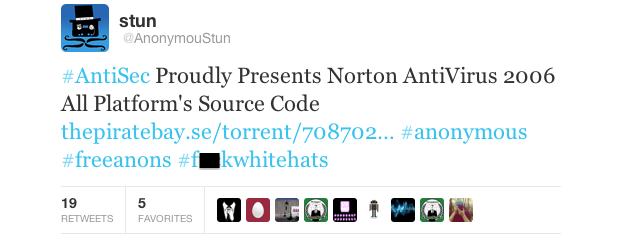Anonymous leaks Symantec's Norton anti-virus source code

Anonymous, for which LulzSec was distantly related to, has leaked a copy of the Symantec Norton Antivirus 2006 source code on to peer-to-peer site The Pirate Bay.
Those who claim to be members of Anonymous have said for months that they were in possession of the source code, something that Symantec eventually admitted to, but only confirmed that a "segment" of the code leaked at the time.

The download file, at 1.07GB, appears to include the source code to a number of products within the software, including the consumer version, the corporate edition, and other files for Windows, Unix, and NetWare.
The code is thought to have been access from a network belonging to the Indian intelligence services. But Symantec would not confirm who the third-party involved is.
Attached to the file, a note calls for the release of the LulzSec hackers, who were taken down by the authorities this week. There was an exception of one name, however: "Sabu", or Hector Xavier Monsegur, who was the leader of the group, and suspected of working with the FBI to inform on his fellow hackers.
It is believed that the Indian authorities wanted access to the source code to ensure that the product was secure. Symantec agreed, and the code was inspected. But the source code was left to stagnate on a poorly-secured network which was then accessed by the hackers.
The anti-virus and security company previously said that the breach will "not affect any current Norton product". It added: "The current version of Norton Utilities has been completely rebuilt and shares no common code with Norton Utilities 2006. The code that has been posted for the 2006 version poses no security threat to users of the current version of Norton Utilities."
Symantec was unavailable for comment at the time of writing.
Image source: Twitter/ZDNet.
Related:
- LulzSec hackers ‘brought down’ by own leader
- Symantec confirms hacker theft of Norton anti-virus source code
- Symantec accused of using 'scareware' tactics to sell full-version products
- Have RIM, Nokia & Apple provided Indian Military with backdoor access to cellular comm?
- Ed Bott: Symantec says it's safe to use pcAnywhere again
- CNET: That stolen Symantec source code? It’s for older enterprise products
More on LulzSec:
- Anonymous intercepts, records FBI, Scotland Yard cybercrime call
- LulzSec still sitting on vast cache of unreleased data
- Suspected LulzSec player arrested, in custody in London
- LulzSec: Is it too cocky for its own good?
- LulzSec, Anonymous and hacktivism: Crappy security has caught up with us
- LulzSec disbands: Final cache includes AT&T internal data and 750,000 user accounts
- LulzSec leaks 62,000 emails and passwords, also targets CIA
- Scotland Yard battles LulzSec, Anonymous on Twitter
- LulzSec: “Snitches get stitches”